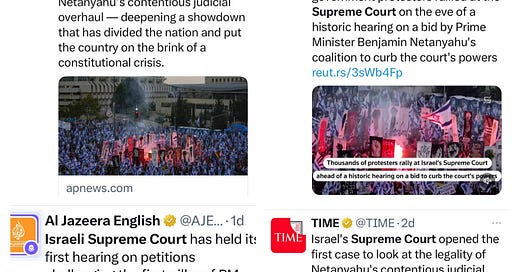1. In a Full Panel of Fifteen Justices, The High Court of Justice Deliberated the First Appeal Regarding the Judicial Overhaul
In an (almost) unprecedented event, with the full panel of all fifteen justices, Israel’s High Court of Justice heard petitions against the elimination of the reasonableness doctrine, that was defined as a basic law amendment. A basic law in Israel is considered part of a future constitution, therefore it has a special status in the code of law. The court sitting was broadcast live, and it felt like the whole country was glued to their screens following the legal arguments. The sitting lasted fourteen and a half hours. The timeline is demanding. Two of the justices, including the chief justice Esther Hayut, will retire in next month and they will then have three months to conclude all open cases and other unfinished business.
The judicial system in Israel is that the Supreme Court has two tracks, a court of appeal for lower court rulings, part of the legal rights, and another track in which the Supreme Court acts like a constitutional court and rules on issues regarding the practices of state agencies, if an individual, or a community or a core value is being threatened or violated. The case of the reasonableness doctrine falls into the latter track of the court. In the majority of the cases, from both tracks, the court convenes in panels of three. In high profile cases there are larger panels, but almost never a full panel of all fifteen justices.
The discussion was controversial, among other things, because the State Attorney refused to argue in favor of the bill, and actually joined the plaintiffs against the bill. As a result the coalition had to hire a private lawyer to represent their case.
Prior to the court sitting, tens of thousands of people traveled to Jerusalem as part of the ongoing protest against the judicial overhaul. They gathered in front of the Supreme Court, to support the court. It was also published that the police had to provide the justices with individual security.
Prior to the court sitting, there were direct and indirect threats against the judges by senior politicians in office like the speaker of the house and other ministers and members of Knesset saying that the court should not by any means challenge a basic law.
This was the first in a series of petitions that were submitted to the High Court of Justice against bills that are part of the judicial overhaul. Next week the court will convene to hear another controversial case, the petition against the minister of justice to force him to convene the committee to nominate judges. Minister of justice, Yariv Levin insists on changing the composition of the committee so the coalition will have a majority in the committee, but this law is pending and has not passed to date. Meanwhile the minister who has the exclusive authority to do so, will not convene the committee while there are many vacancies to be filled in all courts. There will soon be vacancies in the Supreme Court since the Chief Justice and another justice will retire. In Israel, by law, judges have to retire at the age of seventy.
All major media outlets in Israel and all over the world addressed the sitting of the court, and it made headlines as an important Israeli jurisprudential milestone.
2. Another Crisis in the Coalition, Led by Extreme Right Party - Otsma Yehudit
Leader of Otsma Yehudit (Jewish Power) Minister of National Security, Itamar Ben-Gvir announced that his party will not vote with the coalition. The crisis is around the decision of the government, supported by the security state agencies, to supply some security equipment to the Palestinian Authority (PA) so they can operate. The crisis is also concurrent with the wish of Ben Gvir to strip the Palestinian prisoners in Israeli prisons from some of their human rights. Both claims led Ben Gvir to announce that his party will not vote with the coalition. It is important to say in this context, that the Knesset is now in recess, for the duration of the Jewish holidays, and will re-convene only on October 15. On the one hand, the Jewish Power party can threaten the coalition with its’ six seats (the coalition majority is based on 64 out of 120 seats), on the other hand, they don’t really have an alternative government and they depend on the coalition as much as the coalition is based and dependent on their support.
3. PM Netanyahu to Depart on a US Visit, Schedule Reveals Few Meetings and Events
PM Netanyahu and his entourage will depart next Sunday on the first trip to the US since his election in November 2022. According to the media, although Netanyahu will spend six days in the US, his schedule includes few meetings. He is scheduled to spend one day in San Fransisco to meet with tech mogul Elon Musk and then fly to New York City where he will stay until his address to the UN plenum on Friday, where he is expected to meet with President Biden. Analysts also commented that the schedule includes conditional meetings, contingent upon any progress made in reaching a compromise with the opposition regarding the judicial overhaul.
The trip comes at a time of a severe constitutional crisis in Israel, as the high court of justice is deliberating a decision on the petitions submitted to overrule the law cancelling the reasonableness clause in judicial review, passed by the Knesset in July 2023. According to the media, PM Netanyahu is seeking to convince President Biden that the judicial and constitutional crisis is under control and that he is actively seeking to reach a mutually acceptable compromise with the opposition, based on a recent outline proposed by President Herzog. Yair Lapid, head of the opposition (Yesh Atid) said that “the goal of the compromise proposal is not to reach a broad agreement, but to pave the way for an invitation to the White House and to challenge the high court justices, as they deliberate on the petitions against the cancellation of the reasonableness clause.
Ahead of the visit, hundreds of artists, academics, and influencers sent an open letter to President Biden and to UN Chair Gutiérrez urging them not to meet with Netanyahu and to not believe his lies regarding a possible compromise. In preparation for his visit to the UN next week, local anti-overhaul activists projected a digital poster on the walls of the UN building, calling out Netanyahu as a liar.
A crisis was resolved after Israeli political commentators announced that they will not cover the PM’s speech to the UN, since they were not allowed to board the PM’s airplane to return to Israel on time before Yom Kippur. Following the public announcement by several prominent political commentators, the PM’s office issued an update that the correspondents will in fact be able to return to Israel with the PM’s entourage in time for Yom Kippur.
4. Hassidic Pilgrimage to Uman, Ukraine Causes Major Public Controversy
As tens of thousands of Hassidic Jews from Israel and around the world are making their way to Uman, in war-stricken Ukraine, a major controversy erupted as PM Netanyahu urged pilgrims to refrain from traveling to the Ukraine, since neither Israel nor the Ukraine can guarantee their safety.
As Hassidic Jews are determined to practice the traditional Rosh Hashana (Jewish New Year) pilgrimage to Uman, the birthplace of Rabbi Nachman of Breslaw, PM Netanyahu urged them to reconsider their trip this year, citing that "God has not always protected us, neither on European soil nor on Ukrainian soil." His statement sparked public uproar among Haredi influencers and politicians, most notably by MK Yisrael Eichler, who called Netanyahu out and claimed that it was the Zionists, rather than God who were responsible for the suffering of the Jews during the Holocaust. Eichler added: "for more than a century, the God of Israel has saved the Land of Israel from the idolatry of power, from the vulgarity and assimilation of the secular regime. The Germans were stopped on their way to conquer Israel by extraordinary miracles, not because of the Zionists," Eichler asserted.
Eichler’s statement, in turn, sparked harsh criticism from his own coalition partners. Minister of Education Yoav Kisch demanded that Eichler "withdraw his defamatory anti-Zionist remarks," adding that he was "ashamed" of Eichler’s comments, as the grandson of a Zionist soldier who fought the Nazis.
The official Ukrainian news website reported that the government is making special efforts to secure the safety of the pilgrims. Ukraine’s ambassador to Israel, Yevhen Korniychuk, called on Jerusalem to provide Kyiv with anti-aircraft defense to protect Jewish pilgrims. The Israeli media reported that dozens of Israeli policemen will also accompany the pilgrims.
5. Severe Weather Conditions and Heavy Rains All Over the Country:
The remains of Storm Daniel, that wreaked havoc in the Mediterranean, mainly heavy rains and severe flooding, reached Israel early Wednesday morning. The storm hit Greece and Libya and caused extreme floods and heavy casualties. The death toll in Libya was high and reached 5,000 deaths. Greece also suffered from unprecedented floods causing extensive damage.
Fortunately when the storm arrived to Israel it had weakened and did not cause any severe casualties or damage.
This natural event is another reflection of climate change. Israel also suffers from an escalation of summer temperatures for longer periods, as Israel is part of the desert. To date Israel’s governments have barely invested in any substantial and long term plan to fight the causes and impact of climate change and this topic rarely appears on the public agenda or on the tables of decision makers. All extreme weather events are seldom framed as part of the climate change crisis when they are covered by the mainstream media or discussed publicly.
We wish all of our followers who observe the Jewish New Year a happy, sweet and healthy year!
For further reading:
Judicial Overhaul: Here, here, here, here, here
Ben Gvir: Here, here, here
Netanyahu USA: Here, here, here, here











